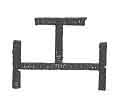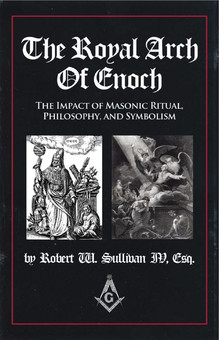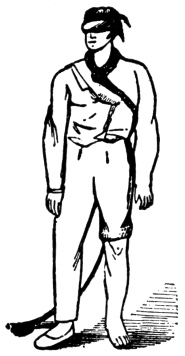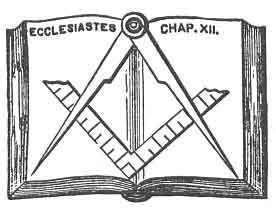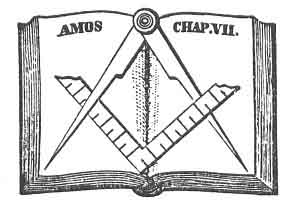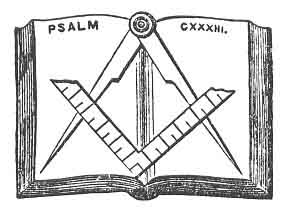Q. What was the word of the master of the second veil?
A. I am that I am, I am hath sent me unto you, Shem, Ham, and Japheth.
Q. What is his sign?
A. It is in imitation of that given by God to Moses, when he commanded him to put his hand into his bosom, and when he took it out, behold it was as leprous as snow.
Q. What is his word of explanation?
A. It is explanatory of that sign, is recorded by Moses, and is as follows: And the Lord said unto Moses, Put now thine hand into thy bosom, and he put his hand into his bosom, and when he took it out, behold, his hand was leprous as snow. And He said, Put thine hand into thy bosom again, and he put his hand into his bosom again, and plucked it out of his bosom, and behold it was turned again as his other flesh. And it shall come to pass if they will not believe thee, neither hearken to the voice of the first sign, that they will believe the voice of the latter sign.
p. 261
Q. Where did you meet with the next obstruction?
A. At the third veil, where, on making the regular demand, we heard the master of that veil exclaim as before.
Q. Your answer?
A. As before.
Q. What were you then asked?
A. By what further right or benefit we expected to obtain this important privilege.
Q. Your answer?
A. By the benefit of the word and sign given us by the masters of the first and second veils.
Q. Did they gain you admission?
A. They did within the third veil.
Q. What was then said to you?
A. Good men and true you must have been, to have come thus far to promote so noble and good an undertaking, but further you cannot go without my sign and word of explanation and signet.
Q. What was his sign?
A. It is in imitation of that given by God to Moses, when he commanded him to take of the water of the river and pour it upon the dry land.
Q. What is his word of explanation?
A. It is explanatory of that sign, is recorded by Moses, and is as follows: And it shall come to pass if they will not believe also these two signs, neither hearken unto thy voice, that thou shalt take of the water of the river and pour it upon the dry land, and the water which thou takest out of the river shall become blood upon the dry land.
Q. Where did you meet with the next obstruction?
A. At the fourth veil or sanctuary, where on making the regular demand, we heard the Royal Arch Captain exclaim, “Who dares approach the fourth veil or sanctuary, where incense burns upon our holy altar both day and night? Who comes here?”
Q. Your answer?
A. Three worthy sojourners, who have come up to help, aid, and assist in the rebuilding of the house of the Lord, without the hope of fee or reward.
Q. What were you then asked?
A. Whence came you?
Q. Your answer?
A. From Babylon.
Q. Of what were you then informed.
A. That by a decree of the Grand Council, then in session,
p. 262
made in consequence of difficulties having arisen by the introduction of strangers among the workmen, none are permitted to enter the presence of the Most Excellent High Priest, Excellent King, and Scribe, while sitting in council, excepting the true descendants of the twelve tribes of the children of Israel; it was therefore necessary that we be more particular in tracing our genealogy, and demanded who we were.
Q. Your answer?
A. We are of your brethren and kin–children of the captivity–we have been received as Most Excellent Masters, and as such have made ourselves known to the several guards, and now wait permission to enter the presence of the Grand Council.
Q. What were you then asked?
A. By what further right or benefit we expected to obtain this important privilege.

Moe is the founder of GnosticWarrior.com. He is a father, husband, author, martial arts black belt, and an expert in Gnosticism, the occult, and esotericism.

